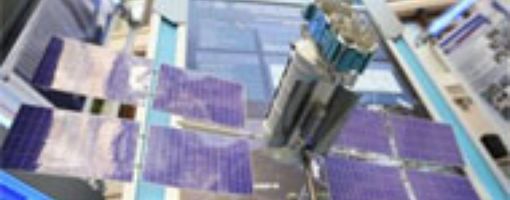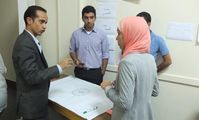Communication and Information Technology

Here in Egypt, major multinationals including Intel and France Telecom's Orange are developing products for export to the global market. Egyptian call centers are not just catering to the offshore needs of hundreds of major multinationals such as Microsoft and Oracle; In the case of regional leaders Xceed and Teleperfor-mance. they're also delivering training and certification for the global outsourcing industry itself.
The list goes on — as you would expect from a sector that has grown at a sustained 25% per year, attracting EGP 50 billion in new investments in the last four years. No wonder Egypt ranked thirteenth on AT. Kearney's 2007 Global Services Location index — it's a testament to Egypt's educated, multilingual workforce; to the nation's exceptional ICT infrastructure; to the impact of training programs; and to the value of unwavering government support to industry.
Home-Grown Talent
While Egypt is proud to be home to the local and regional offices of major multinationals, it is even prouder to have incubated local talent. Egypt-based Orascom Telecom (OT), established in 1998, is among die largest and fastest-growing emerging-market mobile network operators with more than 70 million subscribers in countries including Algeria, Egypt. Pakistan. Bangladesh. Tunisia and Zimbabwe. In early 2008, Orascom Telecom won the first-ever license to operate a mobile network in North Korea. Wind, OT's sister company under the Weather Investments umbrella, is now: a growing European player with mobile, fixed line and data networks in Italy and Greece.
A number of promising Egyptian software developers have also started penetrating international markets. Companies including ITWorx. ITsoft, Sakhr, Harf and Arabize are now exporting software ranging from Arabic-language solutions to plugins and modules for some of the world's most popular software packages. Programmers at ITWorx are developing solutions for the regional and global telecommunications and banking sectors — and software for Microsoft, Adobe and Corel. Major multinationals are developing products here for export to the global market.
Meanwhile, the government is incubating the next generation of Even Indian companies are outsourcing to Egypt's burgeoning IT sector.
technology entrepreneurs at the Smart Village through the national business plan competition.
There are also a handful of Egyptian companies that have begun to conduct their own high-tech R&D. Young developers with graduate degrees from top global institutions are creating the next generation of wireless technologies at SySDSofl. an SME that specializes in developing cutting-edge wireless communications technologies for global standards such as WiMAX. Within Egypt's ICT development strategy, virtual R&D centers of excellence have been established in niche areas such as data mining and wireless technologies. Other support comes from the private-sector Technology Development Venture Capital Fund.
More man 50% of the ICT business community in Egypt is comprised of SMEs — in the short and medium terms, they will be the key drivers of growth in the sector.
A True Partnership
Incentive packages have attracted global multinationals in industries including call centers, business-process outsourcing and knowledge-process outsourcing to open shop in Egypt with promises of expansion and further investments. They have found that Egypt's talented young workforce and world-class telecom infrastructure help them do business faster, better and cheaper.
Over the past decade, the groundwork for the sector's explosive growth has been laid through a series of megaprojects designed to create a globally competitive ICT industry in Egypt. Key to this process: close cooperation between government and industry stakeholders. This partnership created the nation's robust technology and communications infrastructure and today serves as the basis for the ongoing commitment to public-private partnerships in all sector-related developments and initiatives.
Underpinning the success of domestic and multinational players alike: a qualified base of human resources, a bouquet of enabling laws and a solid infrastructure at the crossroads of major global submarine cables.
Each year, 250,000 university graduates enter the workforce; a great many are immediately employable, while others take advantage of government-backed training programs to find jobs in die ICT sector — part of a proven government plan that is seeing heavy investment flowing into both professional IT education and training for the basic needs of the industry. The nation's rock-solid IT infrastructure includes three robust mobile networks and widespread access to broadband (see page 14 for more details).
Finally, enabling laws regulating everything from telecommunications and labor to e-signatures and the protection of both intellectual property and the rights of investors provide local and global competitors with a solid, rights-based foundation from which to do business.
Smart Village
Smart Village is Egypt's first fully operational technology park. Inaugurated in 2003, it is a clear demonstration of the sector's development and maturity. From government headquarters to global ICT multinationals, from the local private sector to innovation centers, incubators, and training institutions, Smart Village is an all-inclusive community. Home to international ICT giants such as Oracle, Microsoft, Motorola, Vodafone and Alcatel, it is the physical expression of the international industry's faith in Egypt's promise.
Today, other countries are looking to replicate the concept and create productive ICT communities of their own. The concept of an IT cluster has been so successful that it has expanded to include other business segments including financial services: In 2009, the Cairo and Alexandria Stock Exchange is expected to relocate to SmartVillage along with other financial institutions and major national and regional investment banks and private equity firms, creating the nation's first Financial Zone.
Building on the success of the Smart Village and serving the aims of Egypt's export strategy, the ministries of CIT and Investment are establishing a call-center facility in the upscale Cairo suburb of Maadi and are looking to replicate the model in other parts of Egypt. At the same time, intensive training and capacity-building programs are taking place, designed to ensure that local, regional and multinational players alike can find the qualified staff they need to be globally competitive from their base in Egypt.
Your Rating:
Overall rating: 0.000
Totally voted: 0
Comments
Weather in:
Exchange Rates
-
IMF loan expected next month
Apr 22, 2013, rating: 3.000, 3 votes Egypt may secure an International Monetary Fund loan agreement in about amonth, state news agency MENA reported, quoting "informed" sources ...
Egypt may secure an International Monetary Fund loan agreement in about amonth, state news agency MENA reported, quoting "informed" sources ...
-
Egypt received 11 million tourists in 2012 and aims to boost that number to 14 million in 2013.
Jan 22, 2013, rating: 3.000, 2 votes
Egypt received 11 million tourists in 2012 and aims to boost that number to 14 million in 2013.
-
Egypt limits travelers leaving country to US$10,000 in cash
Dec 26, 2012, rating: 3.250, 4 votes Egypt has banned travelers from carrying more than US$10,000 in foreigncurrency cash in or out of the country ...
Egypt has banned travelers from carrying more than US$10,000 in foreigncurrency cash in or out of the country ...
-
National Coalition on Climate Change for Egypt is born
Nov 30, 2012, rating: 5.000, 1 votes The global COP18 conference on climate change opens in Doha Monday.About 17,000 participants from all over the world ...
The global COP18 conference on climate change opens in Doha Monday.About 17,000 participants from all over the world ...
-
Judgment for sexual harassment
Nov 14, 2012, rating: 3.600, 5 votes A man was sentenced to two years in prison and fined LE 2,000 for sexually harassing a woman, an ...
A man was sentenced to two years in prison and fined LE 2,000 for sexually harassing a woman, an ...
-
Scientists are enthusiastic about hydrogen's green applications
Nov 13, 2012, rating: 4.000, 3 votes
As fossil fuel reserves decrease, many countries are turning to hydrogen as one of the main sources of alternative energy ...








